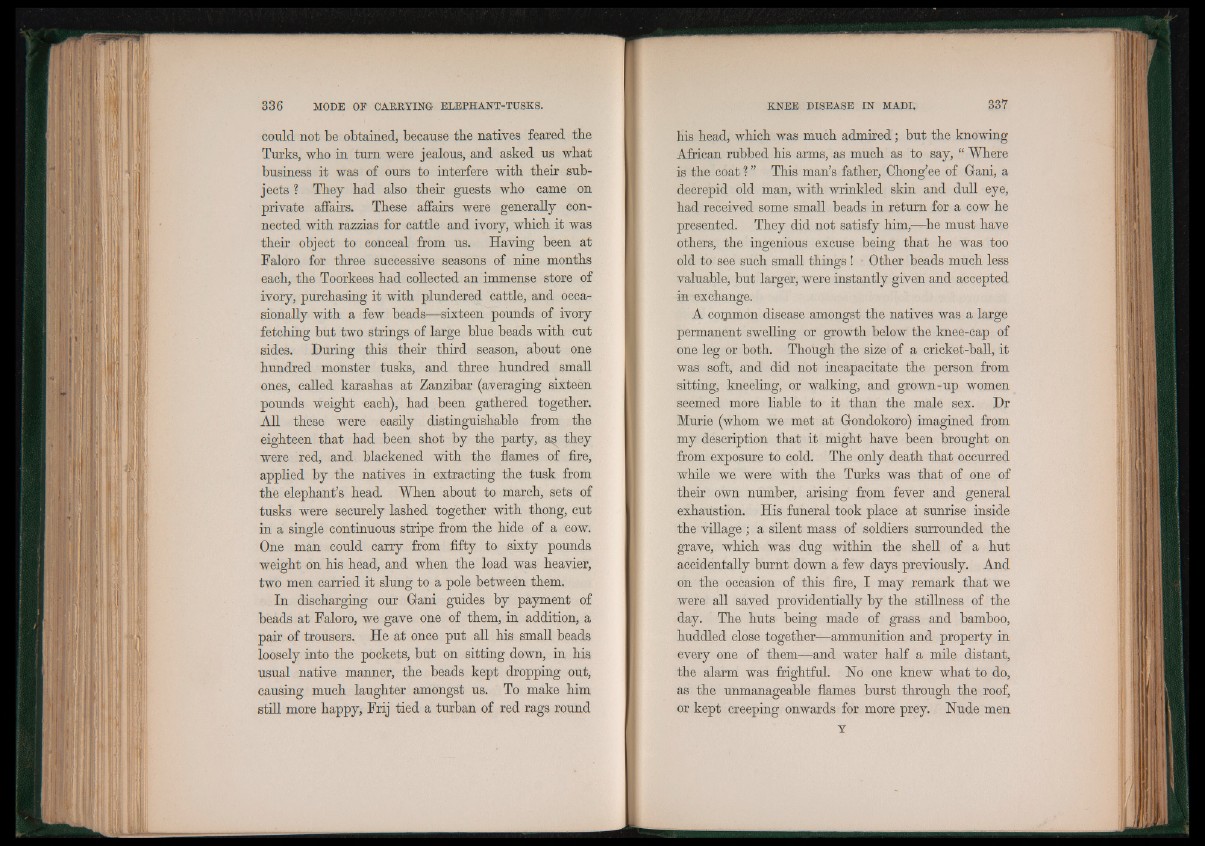
could not be obtained, because the natives feared tbe
Turks, who in turn were jealous, and asked us what
business it was of ours to interfere with their subjects
? They had also their guests who came on
private affairs. These affairs were generally connected
with razzias for cattle and ivory, which it was
their object to conceal from us. Having been at
Faloro for three successive seasons of nine months
each, the Toorkees had collected an immense store of
ivory, purchasing it with plundered cattle, and occasionally
with a few beads—sixteen pounds of ivory
fetching but two strings of large blue beads with cut
sides. During this their third season, about one
hundred monster tusks, and three hundred small
ones, called karashas at Zanzibar (averaging sixteen
pounds weight each), had been gathered together.
All these were easily distinguishable from the
eighteen that had been shot by the party, a§ they
were red, and blackened with the flames of fire,
applied by the natives in extracting the tusk from
the elephant’s head. When about to march, sets of
tusks were securely lashed together with thong, cut
in a single continuous stripe from the hide of a cow.
One man could carry from fifty to sixty pounds
weight on his head, and when the load was heavier,
two men carried it slung to a pole between them.
In discharging our Gani guides by payment of
beads at Faloro, we gave one of them, in addition, a
pair of trousers. He at once put all his small beads
loosely into the pockets, but on sitting down, in his
usual native manner, the beads kept dropping out,
causing much laughter amongst us. To make him
still more happy, Frij tied a turban of red rags round
his head, which was much admired; but the knowing
African rubbed his arms, as much as to say, “ Where
is the coat?” This man’s father, Chong’ee of Gani, a
decrepid old man, with wrinkled skin and dull eye,
had received some small beads in return for a cow he
presented. They did not satisfy him,—he must have
others, the ingenious excuse being that he was too
old to see such small things ! ■ Other beads much less
valuable, but larger, were instantly given and accepted
in exchange.
A coijimon disease amongst the natives was a large
permanent swelling or growth below the knee-cap of
one leg or both. Though the size of a cricket-ball, it
was soft, and did not incapacitate the person from
sitting, kneeling, or walking, and grown-up women
seemed more liable to it than the male sex. Dr
Murie (whom we met at Gondokoro) imagined from
my description that it might have been brought on
from exposure to cold. The only death that occurred
while we were with the Turks was that of one of
their own number, arising from fever and general
exhaustion. His funeral took place at sunrise inside
the village ; a silent mass of soldiers surrounded the
grave, which was dug within the shell of a hut
accidentally burnt down a few days previously. And
on the occasion of this fire, I may remark that we
were all saved providentially by the stillness of the
day. The huts being made of grass and bamboo,
huddled close together—ammunition and property in
every one of them—and water half a mile distant,
the alarm was frightful. No one knew what to do,
as the unmanageable flames burst through the roof,
or kept creeping onwards for more prey. Nude men
Y